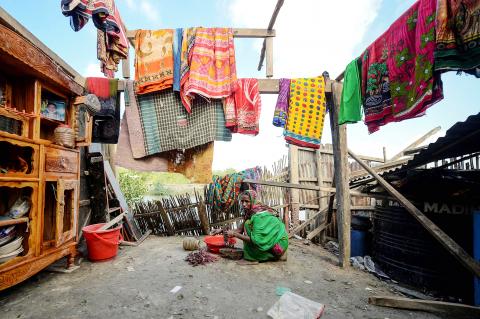Abandoned by her sons, shunned by her neighbors and branded a witch. Mosammat Rashida’s crime? Her husband was killed by a Bengal tiger. Women like her are ostracized in many rural villages in Bangladesh, where they are viewed as the cause of their partner’s misfortune. “My sons have told me that I am an unlucky witch,” she said in her flimsy plank home, in the honey-hunters’ village of Gabura at the edge of the Sundarbans — a 10,000-square-kilometre mangrove forest that straddles Bangladesh and India.
Her husband died while out collecting honey in the jungles there.
“Honey-hunters prefer to collect honey mostly in the southwestern Sundarbans, where most of the man-eaters (tigers) live,” leading Bengal tiger expert at Jahangirnagar University, Monirul Khan, said.

Photo: AFP
Tigers are an endangered species but climate change and human development is reducing their wild habitat, often forcing them towards villages in search of food. Wildlife charities estimate there are some 100 tigers in the Bangladesh side of the Sundarbans. At least 519 men died from tiger attacks in 50 villages in one district — home to half a million people — between 2001 and 2011, according to Ledars Bangladesh, a charity helping widows reintegrate back in the villages. Their deaths are a double blow for the women left behind. Already grieving the loss of their partner, overnight they become ‘tiger widows’ — pariahs in their homes and villages at a time when they most need support.
They are often left with little means to support themselves or their families.
BAD LUCK

Photo: REUTERS
Rashida is heartbroken but unsurprised that her adult sons, aged 24 and 27, abandoned her and their two young siblings. “They are part of this society after all,” the 45-year-old said, as she wiped tears from her eyes.
Her tiny shack has no roof — it was blown off by a deadly cyclone — but there have been no offers of help from neighbors or officials, who she claims helped others in the village but shunned her. Instead she uses an old tarpaulin to keep the elements out. Next door, Mohammad Hossain was fixing his broken tin roof, and confessed he had been instructed by his wife not to talk to Rashida. “It would mar my family’s well-being and could bring bad luck,” the 31-year-old honey-hunter said.
Officials denied omitting Rashida from the help they provided after the cyclone. But the head of Ledars Bangladesh, Mohon Kumar Mondal, said the mistreatment of “tiger widows” was widespread in highly conservative communities, which often held “centuries old” prejudices.
“They (charities) are working to restore the widows’ dignities. The main challenge is to change people’s beliefs,” he explained. “The change is very slow. Still, I’d say there has been progress,” he added, noting that younger, more educated villagers were less fearful of the widows.
STAYING ALIVE
Rijia Khatun, who said she has learned to cope with being ostracized by her fellow villagers after her honey-hunter husband’s death 15 years ago, has been secretly supported by her nephew and his family.
“My sons were young. But nobody helped me. I felt bad at first as they kept blaming me for my husband’s death. I didn’t know what was my fault,” she recalled, adding: “But now I’ve learned to live with this adversity.”
Her nephew Yaad Ali, who has witnessed several attacks including his uncle’s, explained that while he wanted to help, he could not do so publicly. “We had to do it (help Khatun) with confidentiality or else the village society would have ostracized us as well,” he confessed. Honey hunting has traditionally been seen as a more accessible vocation for villagers who can’t afford the equipment or boats needed to undertake the region’s other main profession — fishing.
But fears of being killed by the predators — and the consequences for the wives they leave behind — has meant more and more men are opting for a different trade. Harun ur Rashid, whose father was killed by a tiger, said he was now a fisherman, despite coming from generations of honey-hunters. The 21-year-old said: “My mother doesn’t want me to end up like my father. And I want to stay alive and take care of her because she has suffered a lot and endured enough abuses after my father’s death.”

One of the biggest sore spots in Taiwan’s historical friendship with the US came in 1979 when US president Jimmy Carter broke off formal diplomatic relations with Taiwan’s Republic of China (ROC) government so that the US could establish relations with the People’s Republic of China (PRC). Taiwan’s derecognition came purely at China’s insistence, and the US took the deal. Retired American diplomat John Tkacik, who for almost decade surrounding that schism, from 1974 to 1982, worked in embassies in Taipei and Beijing and at the Taiwan Desk in Washington DC, recently argued in the Taipei Times that “President Carter’s derecognition

This year will go down in the history books. Taiwan faces enormous turmoil and uncertainty in the coming months. Which political parties are in a good position to handle big changes? All of the main parties are beset with challenges. Taking stock, this column examined the Taiwan People’s Party (TPP) (“Huang Kuo-chang’s choking the life out of the TPP,” May 28, page 12), the Democratic Progressive Party (DPP) (“Challenges amid choppy waters for the DPP,” June 14, page 12) and the Chinese Nationalist Party (KMT) (“KMT struggles to seize opportunities as ‘interesting times’ loom,” June 20, page 11). Times like these can

JUNE 30 to JULY 6 After being routed by the Japanese in the bloody battle of Baguashan (八卦山), Hsu Hsiang (徐驤) and a handful of surviving Hakka fighters sped toward Tainan. There, he would meet with Liu Yung-fu (劉永福), leader of the Black Flag Army who had assumed control of the resisting Republic of Formosa after its president and vice-president fled to China. Hsu, who had been fighting non-stop for over two months from Taoyuan to Changhua, was reportedly injured and exhausted. As the story goes, Liu advised that Hsu take shelter in China to recover and regroup, but Hsu steadfastly

You can tell a lot about a generation from the contents of their cool box: nowadays the barbecue ice bucket is likely to be filled with hard seltzers, non-alcoholic beers and fluorescent BuzzBallz — a particular favorite among Gen Z. Two decades ago, it was WKD, Bacardi Breezers and the odd Smirnoff Ice bobbing in a puddle of melted ice. And while nostalgia may have brought back some alcopops, the new wave of ready-to-drink (RTD) options look and taste noticeably different. It is not just the drinks that have changed, but drinking habits too, driven in part by more health-conscious consumers and